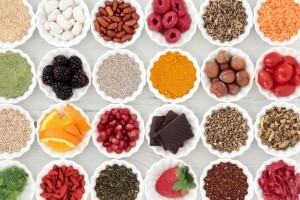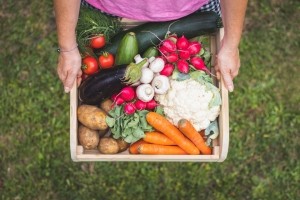Coronavirus and the food chain: FoodBytes! by Rabobank’s six tips for innovation in the ‘new normal’

COVID-19 is disrupting global food markets, from the shut-down in food service to declining levels of investment.
According to the first-quarter report from FoodBytes! by Rabobank, the long-term outlook is ‘uncertain’ due to the threat of economic downturn and rising levels of unemployment. In the investment space, venture capital investment is projected to be 16% lower in the first quarter of this year than in the prior quarter alone.
Start-ups are feeling the squeeze from ‘fast-shifting’ consumer purchasing behaviour, the bank’s start-up innovation team noted.
However, where there is uncertainty, there is also opportunity. FoodBytes! outlined six areas that, it said, have the potential to ‘drive change in a new economy’.
#1: Functional ingredients
The coronavirus crisis has placed immunity top-of-mind for shoppers, who are seeking products that they ‘regularly use’ but with added health benefits.
These concerns are moving well beyond the nutraceutical space and extending into the mainstream.
“With the functional food space growing steadily throughout last year, the outbreak of coronavirus has further accelerated the demand for added health benefits in ‘everyday’ food products, especially those that offer immunity support,” Sonia Shekar and Liz Duijves, start-up innovation analysts at Rabobank, told FoodNavigator.
According to the AI-powered food intelligence start-up Tastewise, which tracks online consumer engagement, mentions of ‘immunity’ in the context of food searches rose 27% between February 2019 and March 2020. Kombucha, pickled vegetables and bitter melon are examples of grocery items that have specifically seen an uptick in interest since the onset of the virus, according to Tastewise.
While consumers seek out health benefits, they are also continuing to show an increased focus on snacking. According to a recent Cargill report, products that offer functional ingredients like pumpkin seeds, turmeric and probiotics will see heightened success in bars, beverages and other snacks.
The Rabobank analysts noted that beverage brands with wellness connotations are thriving amid public health concerns. Other potential bright spots are products with significant health and immunity benefits that ask for minimal consumer behaviour change, like enhanced beverages (teas, coffees, and wellness shots) and fortified snacks (bars, salty snacks).
However, there is a cloud on the horizon. Consumer willingness to pay a premium is likely to decrease during a recession.
FoodBytes! advised: “Emerging brands should be smart about achieving minimal unit costs for premium products.”
For example, FoodBytes! alum ShakaTea’s ready-to-drink tea offers the functional benefits of Hawaiian superfood māmaki, yet remains price competitive at under $3 per bottle. In addition to being sugar-free and keto-friendly, the tea is introducing māmaki's high antioxidant and stress-relieving properties to the broader market.
#2: Accelerating online delivery
Demand for groceries has jumped as the foodservice channel has been forced to shutter during lockdown.
Shoppers are also increasingly interested in buying their groceries online, negating the risk of visiting the supermarket.
The number of households ordering groceries online in March soared to 145.3% compared with August 2019, FoodBytes! noted.
FoodBytes! alum like Oddbox, which just closed its Series A of $3.8M in mid-March, are experiencing ‘unprecedented demand’ for online grocery products.
Oddbox is a UK-based company that delivers bundles of rescued ‘ugly’ produce at a discount to normal retail prices, combatting food waste.
“While the long-term shift in e-commerce is still unknown, it’s likely that the channel will continue to be in high demand,” FoodBytes! predicted.
#3: Local sourcing gets consumer backing
According to RaboResearch analysts Roland Fumasi and David Magana, fresh produce demand has increased significantly in retail, online, and local sales. Orange sales alone are up 60% year-over-year, bolstered by their abundance in vitamin C.
Because products distributed via cold chain have a limited shelf life, demand is more reliable than for packaged and shelf-stable products. But the main risk lies in the supply chain, with larger food delivery operations becoming paralysed by delays, COVID-19 related disruptions and now, worker strikes.
“This has driven an uptick in demand for locally-produced food, with smaller farmers pivoting to direct-to-consumer deliveries and pickups. FoodBytes! alum Seal the Seasons is connecting the dots – the company is making local frozen produce available year-round, while also helping provide small family farms with a reliable income stream.”
#4: ‘Affordable’ packaging solutions
Pre-coronavirus, the food industry was struggling to keep up with the massive shift in consumer attitudes to plastic packaging. The global pandemic has, however, put the food safety and waste benefits that packaging delivers in the spotlight. Growing online sales and a shift to shelf-stable food has also boosted demand.
RaboResearch analyst Xinnan Li acknowledged that there is a positive short-term outlook for the sector. However, with an impending recession she predicted an increased demand for lower cost providers.
“Delivering on that demand is FoodBytes! alum Corumat, which offers packaging up to 30% lower cost than traditional technologies and is derived from sustainable plant-based material; a win-win. The same goes for Element Packaging; last year’s FoodBytes! London finalist services many high profile chains and large distributors in the UK and abroad with its sustainable food packaging solutions,” FoodBytes! said.
#5: Food hygiene is ‘imperative’
Although there is no evidence that COVID-19 is transmitted by food, it can survive on surfaces for several days.
In an industry with products and ingredients changing hands ‘countless times’ in a matter of days, pathogen testing remains integral in the food supply chain process.
Even outside of the industry, the widespread and rapid proliferation of COVID-19 has placed additional importance on rapid pathogen testing to track and control the spread of dangerous diseases.
FoodBytes!, Rabobank’s discovery and networking platform for food and ag innovation, backs a number of start-ups that are working to help deliver safe, hygienic products through the food chain.
“FoodBytes! alum FreshCheck is revolutionising food safety with a simple colour change tool to test hygiene. The Fresh Check Spray is on the market and improving cleanliness in over 80 food companies, with plans to expand to home, healthcare, and beyond,” the report noted.
Another FoodBytes! alum, SnapDNA, has developed the ‘fastest’ food safety pathogen test in the industry. Its technology eliminates the need to culture bacteria prior to analysis, enabling sample-to-answer test results in an hour for key pathogens like listeria, salmonella, and E. coli.
Similarly, YarokMicroBio aims to protect consumers and safeguard producer interests with its fast microbiological testing system for the fresh food industry.
#6: Ag tech for supply chain efficiency

Migrant labour is a cornerstone of many agricultural systems. The supply of labour has been disrupted by global travel bans due to COVID-19.
With concerns that harvests could be left to rot in the fields, Rabobank predicted this ‘sudden and massive’ shock could force adoption of an alternative: on-farm automation.
According to RaboResearch analyst Sam Taylor, farmers will be looking to adopt more technology to draw down on the use of inputs, which could open up R&D opportunities for startups operating in these spaces.
Here too, start-ups are developing solutions. For example, Augean Robotics has developed a data-acquisitive robotic cart that works alongside humans to automate the more tedious tasks of crop harvesting. According to the company, farmers are able to utilise the robot to increase productivity by up to 30%.
Elsewhere, start-ups like DataFarming aim to unlock the potential of precision agriculture products and farm data. DataFarming’s approach puts ‘simple, automated and low-cost digital solutions’ in the hands of agronomists and producers.
“As the supply chain faces uncertainty with each new day, we’re following these alternatives closely.”
COVID-19: Innovation driver or disruptor?
Rabobank start-up innovation analysts Shekar and Duijves observed that some of the trends that have emerged in recent years are well placed to prosper in the wake of COVID-19. The analysts pointed to personalised nutrition and local supply chains, which are ‘well positioned for the new economy’.
However, COVID-19 has not acted as an accelerator for every emergent trend. “The pandemic has certainly caused a disruption of other emerging trends, notably the sustainable packaging movement,” Shekar and Duijves told this publication.
Indeed, according to a recent McKinsey report, consumers have identified the hygiene advantages plastic packaging as potentially 'outweighing concerns about recyclability and plastic-waste leakage into the environment'.
According to RaboResearch packaging analyst, Xinnan Li, this consumer behaviour has certainly transpired in the food industry, with a 'surging demand' for single-use plastic packaged goods and the growth of e-commerce channels.
“On the retail side, many companies that have been working towards sustainable packaging solutions are now forced to prioritise food safety. For example, global coffee-chain Starbucks banned reusable cups amid the outbreak at the beginning of April. In addition, an impending recession will impact wallets, and whether sustainable packaging remains a priority for many consumers remains to be seen,” Shekar and Duijves observed.




















